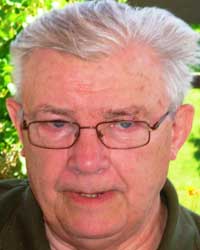Kris Vereecke (1936-2020)
Born in Meulebeke (B) on 15 January 1936
First vows on September 8, 1956
Ordained priest on August 6, 1961
Missionary in Congo (KIN) and Belgium.
Died in Torhout (B) on 10 July 2020 at the age of 84
Father Kris was born in Meulebeke, but the family moved to Kuurne. After his humanities at St. Amand College in Kortrijk, he entered the Scheut Novitiate in Zuun and took his first vows on September 8, 1956. He studied philosophy for two years in Scheut-Brussels and theology in Leuven for four years. After the third year of theology, he was ordained a priest on August 6, 1961.
In 1962, our Congregation celebrated its 100th anniversary. One of the great moments of the centennial was the celebration of the Eucharist in the basilica of Koekelberg. Kris stood on a platform leading the Scheutists' choir with short and powerful gestures. The “experts” of the music said afterward: “He did it well!”. Kris left for the mission in Congo (Kinshasa) in October of the same year. There he spent some difficult moments related to the first years following independence. Before his departure to Congo, Kris had doubts, but he left. After four months of initiation in Kinshasa, he went to Gemena in the north of Congo, which was then under the jurisdiction of the Diocese of Lisala. But from 1964 onwards, this region has become part of the new diocese of Budjala. He spent his entire missionary life in three posts, the first years as a “Père routier” (itinerant priest) and then as mission superior. From 1963 to 1973, he was successively in Bobadi, Gbosasa, and Takaya; from 1974 to 2000 in reverse order: Takaya, Gbosasa, and Bobadi. Kris had musical talent, and he manifested it naturally throughout his missionary life. He rehearsed songs in Lingala and Ngbaka with catechumens. Kris also learned the language of the local people and loved them for a lifetime. And he endlessly contemplated the savannah that stretched from Gbosasa where he lived to the Central African Republic.
His real-life had begun when he became a “Père routier”, as he was called, even though he didn't like to travel at all. He was reluctant to travel because he had to take a jeep to get around the road. Just thinking about it sometimes even made him sick. Yet he did it for several years. And each time, he took all his courage and went on a trip. Kris taught catechism zealously. He would interrupt his catechetical lessons to sing. The catechumens, even more enthusiastic and lively, loved this way of doing things. He expressed his appreciation of the attitude of the catechumens with a laugh that made everyone happy. while Kris was reluctant initially to travel, his courage to always travel leads us to ask: “but from where did this courage come?”. Of course, he said yes, he chose the people of the region where he traveled. And he loved the language, the sayings, and the stories. Yet this was not the reason that justifies his trips despite his fear for his body and the roads that were inaccessible for all those years!
The gospel we just heard sheds some light on the real reason why Kris traveled. Matthew writes about the difficulties around Jesus and Isaiah's prophecy being fulfilled. Indeed, Jesus is the servant of God to whom the Spirit of God is given to carry out firmly and gently his difficult mission. Thanks to his family, his uncle Scheutist, Father André Vereecke, and thanks to Kortrijk's scout movement, Kris became fascinated with Jesus of Nazareth. Moreover, the years of his training as a missionary helped him to deepen his love for Jesus. It is Jesus who continues to give the sign of his Presence in humility and gentleness. Of course, with a preference for the people of "those faraway villages," for whom these dreadful journeys had to be undertaken ceaselessly.
Jesus showed through his life how weakness could become strength and inspiration. This Man who was born in weakness and died in great weakness is an intensely human Christ, someone who is like us. His road, which descends, is a road that passes right here before our doorstep. Kris seems to have understood this. He has gone on a journey. And above all, having arrived, he appreciated it.
Like all of us, he was carried by the faith of the people who sang and danced in the liturgical celebrations. It was joy that they visibly felt because of their faith. This faith surpassed a part of their lives that is still marked by the heavy burdens they carry: the death of many small children, a palaver among themselves, a sudden fungus on a cassava tree, a person's illness and where to take him and how to pay the bills, etc. Kris listened, said what he had to say, and also tried to address their needs. He took a few sick people to the hospital. It was not spectacular, but it was in line with what Emmanuel Levinas wrote about the little kindness: “the kindness of daily life that is fragile and temporary. It is a kindness without witnesses, silent, voluptuous, modest, without triumph. It is gratuitous and for this very reason, eternal”.
Kris remained involved as superior at Takaya and Bobadi even when he started wondering if it was time to leave the mission to the indigenous clergy and return to Belgium. In 2000, after 38 years in the Congo, Father Kris definitely returned to the region of his youth. He was 64 years old when he became a chaplain in the Sint-Carolus retirement home in Kortrijk, and he was happy. There too was a remarkable regularity: Kris worked there for 19 years; half of the 38 years spent in the Congo. And yet, he did not pass through the door of the Kortrijk community. His apartment and the residential and care center became his new home, where he visited people, prayed and celebrated the liturgy with them, and lived and enjoyed walking around the city. Kris continued until it was no longer possible. Then he accepted a helping hand and went to the CICM community of Kortrijk. He was 83 years old at the time and was happy. Too bad! It did not last long.
At the end of April of this year, less than three months ago, his health deteriorated severely, and he went to the community of Torhout for more care. Though the latter route is excellent and free of obstacles, he probably had to think about it often. There is no point in guessing. He was ready and attentive, though sometimes with an occasional smile. He passed away peacefully at our home in the morning of July 10. We will miss this brave man. Lord, may he come to your place of peace. Call him by his name. Let Kris enter your place of peace and tranquility. Amen. ■
by Willy Vanhaelewyn and Werner Lesage

